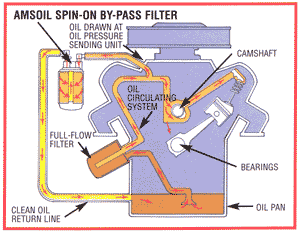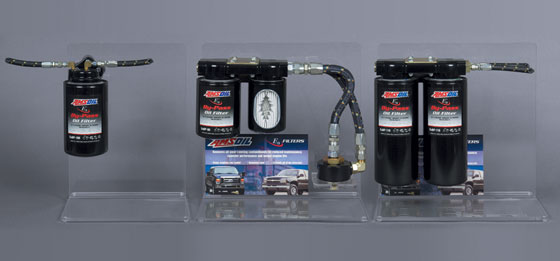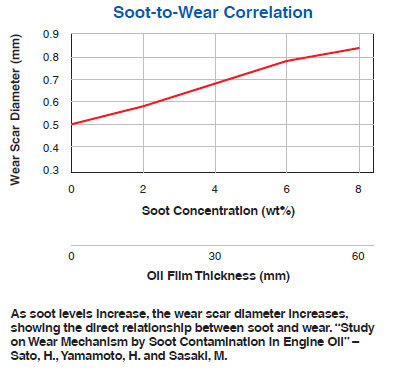
Bypass Oil Filtration System Overview Increase engine life while simplifying maintenance. AMSOIL Bypass filter kits also remove soot and deposits which shorten an oil's effectiveness.
Ultimate Oil Filtration – Solves Problems – Reduces Wear
Here at the Synthetic Warehouse, we are known for helping customers select the right bypass oil filtration kits for their needs. The AMSOIL corporate site lacks much of the information. We will be updating with videos and better examples as we go with this new site.
What is a Bypass?
Cars last longer with clean oil. Bypass filters were the first type of oil filters used on cars. The best filtration is a combination of both as they cater to different conditions. A bypass filter is a partial flow system. By having the ability to remove significant particulates and debris, the oil flow in a full flow would be too low to provide the minimum oil for for engine protection. So they call it a bypass because about 10% or less is bypassed away from the lubrication system to the filter for a more analytically clean end product. A bypass filter not only removes significant wear material but soot and sludge which accumulates in high temperature applications.
Which Kit?
Basically, beside the major Light duty diesel trucks which we have specific kits for, the choice is yours between the single and the dual. The decision is generally made regarding space available. Both single and dual will filter the same. The dual contains both the full flow oil filter (Remotes your OEM one) and the bypass filter on one unit where as the single has only the bypass and the full flow remains in the stock position. Use our EA Series oil filters on your engine and the results are the same. The only real difference is the single kit takes 8-10% out of circulation to clean while the dual keeps everything in the original flow.
The kits are universal. We have three kits for specific diesel pick-ups and five universal kits.
Universal kits: BMK-21: Single bypass for any vehicle with under 15 quart capacity. Best seller.
BMK-22: Dual Guard – Universal for larger engines – features two parallel bypass oil filters for larger sumps. Still available but the BMK-30 supersedes.
BMK-23: Dual Remote – Universal dual system for any vehicle under 15 quart capacity.
BMK-26: 7.3 Ford Powerstroke kit
BMK-27: 6.6 Duramax Diesel Kit
BMK-28: Ford 6.7 Powerstroke Diesel
BMK-30: Heavy-Duty By-Pass System – Simple 1-gallon single filter.
Find all the kits on the main store page including the newer single kits such as the 31 (Ford 6.0/6.4); 32 (GM 6.6); BMK-33 (Ford 6.7); and our best seller the BMK-34 (Cummins 5.9, 5.0, and 6.7)
Bypass Filter Overview Blog and Install Videos
-
Extend Oil Drain Intervals
You save money because you are changing your oil less often! And with Amsoil Synthetic Oils you use even less. A typical engine with less than 100,000 miles using our Bypass and AMSOIL engine oils should expect at least their oil to last 2-years or up to 50,000 miles which ever comes first when using oil analysis. Also Excellent for that remote stationary engine or that vehicle you will have to rely on when service time is not an option.
-
Increased filtration capacity and life
Your oil is filtered more effectively and efficiently, thus removing more wear particles and reducing the contaminants that cause damage to your engine. Engine life is extended when oil remains analytically clean.
-
Increased fluid system capacity and cooling
Your engine has more oil available to lubricate, cool and protect your engine, once again extending the life of your engine. More oil reduces TBN reduction and can battle acids from soot and deposits better in older cars and diesels.
-
Small particle and soot removal efficiency
Removes more small particles and soot contaminants that can cause engine wear and premature damage to your engine. Filters particles less than 1 micron in size and 100% down to 2. You will get more use out of the investment.
-
Rejuvenate an unknown engine
Safely clean-up deposits from an abused or improperly maintained engine in used cars. #1 reason for install as you can halt or reverse the loss of efficiency to any motor as well as reduce blow-by and other problems which occur in older neglected vehicles. Great for vintage vehicles as well.
Product Description
The AMSOIL Bypass Oil Filter provides the best possible filtration protection against wear, oil degradation, rust and corrosion. Working in conjunction with the engine’s full-flow oil filter, the AMSOIL Bypass Filter operates by filtering oil on a “partial-flow” basis. It draws approximately ten percent of the oil at any one time and traps the extremely small, wear-causing contaminants and water that full-flow filters can’t remove. The AMSOIL By-Pass Filter typically filters all the oil in the system several times an hour, so the engine continuously receives analytically clean oil. Useful for fleets and the when purchasing a used vehicle which one does not know the history.
SOOT REMOVAL:
AMSOIL Ea By-Pass Filters remove 39 percent of soot contaminants less than one micron. Soot removal efficiency can increase approximately 10 to 14 percent when Ea By-Pass Filters are used in conjunction with a standard full-flow filter, even higher in conjunction with Ea Filters or Donaldson Endurance filters.
The Dangers of Soot
The combustion process in diesel engines creates soot. After fuel is injected, combustion occurs, producing soot as a by-product. The combustion particulates then become trapped on the exposed oil film. The rings wipe the particulates into the oil and the fine particulates aggregate, increasing levels of soot in the oil. Oil with dispersant additives will generally keep soot in the range of 0.002 to 0.5 microns in suspension. As the amount of soot suspended in the oil increases, the performance of these additives decreases.
Soot Causes Wear
As dispersants in the oil are consumed, soot particles grow to a size that causes problems. This creates a direct correlation between wear and soot concentration; the higher the concentration of soot, the higher the level of wear (see graph).
Today’s oil manufacturers are extending oil life by holding higher concentrations of contaminants, including soot, in suspension in the oil. They are also increasing fuel economy by reducing oil viscosity and oil film thickness, therefore reducing the critical contaminant size. This further necessitates the use of by-pass filtration, especially
in diesel engines.
Comparing The Two Types Of Oil Filtration
Full-Flow Oil Filtration
Full-flow oil filters install directly into the line of oil circulation; the oil passes through the filter as it travels between the oil pump and the engine. A full-flow oil filter must remove and hold contaminants without obstructing oil flow to the engine. Because they use a thin layer of porous filter paper, most oil filters on the market compromise the filtration of finer materials. Such filters have almost no extended cleaning ability because they have a low capacity for storing dirt.
These “surface-type” paper filters quickly become restricted as debris builds up on the surface, at times forcing the filter bypass valve to open and allow unfiltered oil into the engine. This is most common after the filter ages a few hundred hours and the resins coagulate causing the oil filter’s bypass to open anytime the temperature of the oil is less that 75 degrees Fahrenheit.
Bypass Oil Filtration
Because oil must be filtered quickly while removing most of the particles, the average full-flow filter traps particles as small as 20 microns. Bypass oil filtration uses a secondary filter with the purpose of eliminating nearly all contaminants in motor oil. Bypass filters have high capacities and eliminate much smaller particles than full-flow filters, including those in the two to 20 micron range, as well as soot and sludge. They reduce engine wear and increase oil volume, but their high efficiencies mean they also have higher restriction and must be used in conjunction with a full-flow filter.
Bypass filters operate by filtering oil on a “partial-flow” basis. They draw approximately 10 percent of the oil pump’s capacity and trap the extremely small, wear-causing contaminants that full-flow filters can’t remove. The continual process cleans the oil, reducing long-term wear and helping extend oil life.
When oil analysis is used in conjunction with bypass filtration and AMSOIL’s long life 100% Synthetics the owner will find that by replacing the bypass and full flow filters at their proper intervals usually will suffice for draining the oil. Especially on diesel engines, bypass oil filtration removes soot which also deteriorates important additives in oil.




